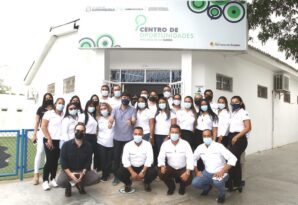Beira’s GCF project has restored essential public infrastructure in the city that was destroyed by cyclones and taken concrete action to prevent climate displacement, building the foundation for an inclusive and climate-resilient future.
The city’s renovation of the 20 de Agosto Market not only repaired storm damage but also created a sanitary and welcoming economic hub for local fish vendors. Additionally, the Market is now home to Beira’s Disaster Risk Management Committee office. The Committee’s new consolidated base of operations has already led two evacuation simulations for extreme weather events to improve disaster preparedness and help Praia Nova residents learn about and adapt to climate change, particularly severe coastal storms.
As part of the project’s relocation activities, the city identified 30 high-risk families, an estimated 150 people who live under repeated and severe flood threat in Praia Nova, to voluntarily relocate to safe, permanent housing in Muave—an area of Beira on higher ground. In addition to housing, land, and basic services, relocated families will receive land ownership certificates, which protect their security of tenure and provide the stability needed to pursue education and livelihoods. Beira’s initial relocation of 15 families serves as a pilot for relocating 1,000 families in the years ahead, and the municipality is in active talks with multilateral development banks to further invest in Muave as a habitable, climate-resilient haven for more families from Praia Nova
In addition to strengthening institutional resilience in Praia Nova, the success of Beira’s GCF project will provide a critical launch point for the city’s plan to develop Muave into a lively neighborhood of retreat for families at risk of displacement along Beira’s coastline.






